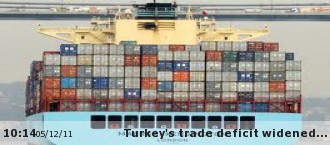 Turkey’s trade deficit widened to a record level in September compared with last year, official figures published yesterday show. Skyrocketing current trade deficit and a low domestic savings ratio in the growing economy raise concerns about the country’s dependency on import products and booming demand, according to professionals. The trade deficit was $10.4 billion in September, the biggest gap recorded, compared with $6.7 billion on September last year and $8.2 billion the previous month, according to figures published by Turkey’s Statistical Institute (TÜİK). Measures taken by Turkey’s Central Bank have thus failed to reduce the trade gap in September, an economist told the Hürriyet Daily News. Turkey might have already experienced the “peak” in its trade deficit by last month, and it might take a few months for the Central Bank’s steps to show their effect on the economy, Erol Katıcıoğlu, a professor at Istanbul Bilgi University, told the Daily News yesterday. “Still, the Bank might be pushing the envelope regarding its moves between restrictive and expansionary monetary policies, he added. More expensive imports The Turkish Lira’s recent depreciation “might be seen as [a chance] to put the brake on booming consumption and imports in Turkey,” said Katırcıoğlu, adding that imports had not slowed down, although they have become more expensive, with the lira’s depreciation. The trade gap grew faster than expected by markets, which estimated the deficit to be around $8.5 billion in September, mainly due to a considerable rise in imports, whichtotaled $21 billion in September – $2 billion higher than the markets’ expectation – thus marking an increase of 35 percent compared to the same month last year. Meanwhile, exports accrued in line with expectations at $10.8 billion. The gap for the first nine months of 2011 was $82 billion. “It is obvious that the annual trade deficit will be way beyond expectations,” said Erdal Sağlam, an Istanbul-based economist. Demand has not been reduced yet in line with expectations from the economy administration, he said, adding that low saving ratios in a country with strong demand could trigger further problems down the line. “We expect to see an economic slowdown starting from November thanks to the Central Bank’s new policy that employs the interest rate corridor to increase overall interest rates in the economy,” he said in a statement emailed yesterday. Domestic savings Structural problems are still preventing Turkey from forging a sustainable economy, said Erdoğan Alkin, a Daily News columnist. The savings ratio problem still remains a key issue ahead of the country, mainly stemming from income injustice and a failing tax policy, he said. The ratio of domestic saving to gross domestic product in Turkey is currently at record-low levels and is expected to go down to 12 percent by yearend, compared to 12.6 pct it was in 2010.
source: hurriyet daily news
|